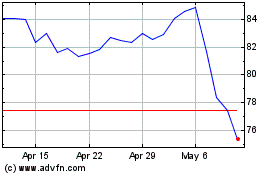Avid Life Media Inc. called a hacker's bluff—and lost.
In July, digital intruders claimed to have stolen user data for
AshleyMadison.com, Avid Life's popular website that facilitates
extramarital affairs. The hackers threatened to release the data
unless Avid Life—then talking of a $200 million public stock
offering—didn't close the service.
On Wednesday, Avid Life confirmed that some of the customer data
posted this week in a dark corner of the Internet is legitimate.
The disclosure sparked a frenzy as people tried to search for their
own names and those of partners, while divorce lawyers said they
were searching for potential evidence and a British florist offered
a discount on "apology flowers."
Avid Life's decision to face down the hackers raises tough moral
and legal questions.
The demand was even more dramatic than that faced by Sony
Pictures Entertainment late last year. Then, hackers believed to be
affiliated with North Korea wanted the studio to cancel the release
of a movie. Avid Life faced a request to close its best-known
business, which claimed 38 million users.
Federal investigators often warn hacking victims not to comply
with hackers' demands—fearing that will only embolden future
attackers.
One problem of dealing with hackers is "you're putting your
trust in someone who is inherently untrustworthy," said Andre
McGregor, a former special agent with the Federal Bureau of
Investigation and now the director of security at Tanium Inc., a
San Francisco Bay Area cybersecurity company.
Lisa Sotto, a partner at Hunton & Williams LLP who
specializes in data breaches, said Avid Life was put in an
impossible position by the demand it shut down. But Ms. Sotto said
the company could have done more in the past month to reach out to
users who may have been affected. For instance, she said she
noticed that AshleyMadison.com's home page on Wednesday still made
no mention of the breach. Rather, users have to scroll through
recent news releases in the press section of the site.
NBC News reported that Avid spokesman Paul Keable said at least
some of the data posted online this week is legitimate. Mr. Keable
and his associates didn't respond to phone calls and emails from
The Wall Street Journal. An outside spokeswoman for Avid, Jennifer
Tong, said only, "I don't have anything additional."
The hackers, or hacker, apparently dumped troves of company
files onto the "dark Web," areas of the Internet not accessible by
consumer browsers. The data included credit-card transactions and
account details but not credit-card numbers, according to security
researchers. In a statement on the Ashley Madison website, Avid
said, "No current or past members' full credit card numbers were
stolen."
It can be difficult to verify the true identities of Ashley
Madison users. The company apparently didn't verify the email
addresses that users supplied.
The website hosting the newly disclosed files can only be
accessed through the Tor browser, special software that allows for
private Web surfing. That also means Avid Life will have a hard
time getting the content taken offline.
As of Wednesday afternoon it was still posted, some 24 hours
after it was first noticed by Wired magazine.
Dave Kennedy, chief executive at security firm TrustedSec,
combed through the files posted online and found documents that he
said seemed legitimate on Avid Life's computer systems and
organizational structure. "The biggest indicators to legitimacy
comes from these internal documents, much containing sensitive
internal data," he wrote in a blog post.
Toronto-based Avid Life confirmed in July that its systems were
breached and that hackers threatened to release data, including
account holders' names, addresses and special Ashley Madison codes
for their preferences. Avid Life said last month it forced
file-sharing websites to take down samples of the stolen data
initially published after the hack.
Brian Krebs, a security blogger, said several users verified
their information was released and that the data appears real. But
he earlier spoke to the founding chief technology officer for
Ashley Madison, now a consultant with Avid Life, who said the
company has seen many fake data dumps in the past month and that it
wasn't certain this latest one was genuine.
Avid Life Media has carved out a niche in offering more thematic
outlets for online dating. In addition to Ashley Madison, there's
CougarLife.com aimed at older women seeking younger men. There's
also EstablishedMen.com, which seeks to match rich businessmen with
young women.
Along with the data apparently released Tuesday was a message
titled "Time's Up" from Impact Team, the name used by the people or
person behind the July breach. It repeats the team's earlier claims
that Avid Life's websites are filled with fraudulent profiles, and
that it charges members an excessive fee to wipe their information
from the site.
"We have explained the fraud, deceit, and stupidity of ALM and
their members," the post reads. "Now everyone gets to see their
data."
On Wednesday evening, a spokesman for Avid Life said it had
hired Cycura, a Toronto cybersecurity firm, to investigate the
breach. Cycura representatives didn't respond to emailed
questions.
Orr Hirschauge contributed to this article.
Write to Danny Yadron at danny.yadron@wsj.com
Subscribe to WSJ: http://online.wsj.com?mod=djnwires
(END) Dow Jones Newswires
August 19, 2015 22:15 ET (02:15 GMT)
Copyright (c) 2015 Dow Jones & Company, Inc.
Sony (NYSE:SONY)
Historical Stock Chart
From Mar 2024 to Apr 2024

Sony (NYSE:SONY)
Historical Stock Chart
From Apr 2023 to Apr 2024
